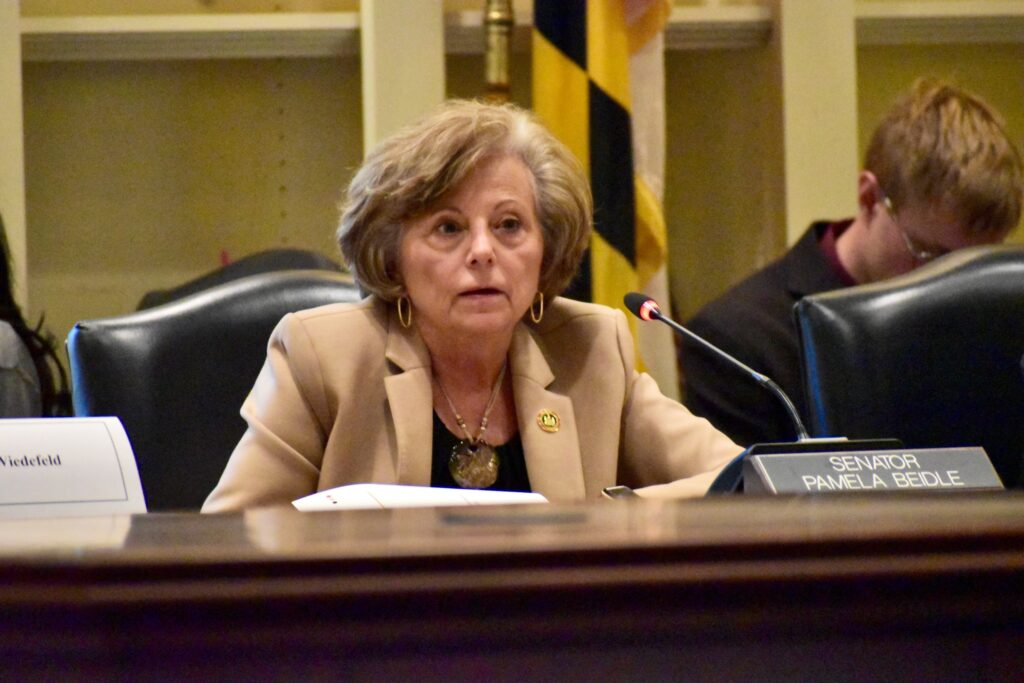Senate Finance Chair Sen. Pamela Beidle (D-Anne Arundel). (Photo by Bryan P. Sears/Maryland Matters)
Moore administration officials are vowing to find a way to fund the state’s register of wills offices, after an “oversight” led to the accidental elimination of their funding with the plan to do away with the state’s inheritance tax next year.
Eliminating that tax was one of the changes proposed by Gov. Wes Moore (D) when he unveiled his fiscal 2026 budget proposal last week. Administration officials said Maryland is the only state with both an estate tax and an inheritance tax, and it could afford to lose the latter.
But one of the details overlooked in the attempt to close a projected $3 billion shortfall in the $67.3 billion budget was the fact that the state’s 24 Register of Wills offices that collect the inheritance tax rely on it for their funding.
“We understand that the inheritance tax would disappear under this budget, but we also understand that our county register of wills are funded by that inheritance tax,” Senate Finance Chair Pamela Beidle (D-Anne Arundel) said during an hourlong fiscal briefing Wednesday. “So what’s in the budget to help fund those county register of wills?”
“It was an oversight in the budget,” said David Romans, a budget analyst with the Department of Legislative Services. “When they were repealing the inheritance tax, I don’t think that occurred to people that that meant the registers of wills, that get a share of the inheritance tax, were going to lose their funding.”
Romans said the Moore administration is aware of the concerns and “will be coming forward with some sort of solution to that problem.”
But the issue has created an air of uncertainty among staff at county offices, said Howard County Register of Wills Byron E. Macfarlane.
“I hope that if there is an alternative funding source found, that it is found quickly and we are able to give that kind of reinsurance to roughly 300 very dedicated public servants who do very important work all over the state,” Macfarlane said Wednesday.
“Our staff are worried about whether they are still going to have health insurance and whether they’re going to have a roof over their head,”
he said. “And these are people who go to work every day and care about what the people we serve are going through.”
A Moore spokesperson said in a statement Wednesday that registers of wills “perform essential services for Maryland residents and the Governor supports them in that work.”
“Their offices are funded as a part of the Comptroller’s budget, and the administration’s intent is to continue to fund them commensurate with current levels,” the spokeperson, Carter Elliott IV, said in the statement.
Voters in every county and the city of Baltimore elect a register of wills, who serves a four-year term. The offices oversee a broad range of public services regarding the estate and wills of people who have died, as well as offering assistance to people working through those processes.
One of their tasks is to collect an inheritance tax on certain possessions or properties passed on when someone dies. Because of exemptions for most close relatives, including spouse, child, grandchild, great-grandchild, stepchild, parent, or grandparent, the inheritance tax is only collected from about 5,000 people a year, Macfarlane said.
He said collections totaled about $95 million in fiscal 2024, a portion of which goes to the offices’ operating costs.
“We use that revenue to fund everything from payroll to health insurance benefits to office supplies, our IT support, retiree benefits, the maintenance of our website … a system that allows the public to obtain copies of records online,” Macfarlane said. “That combined expense is about $35 million a year, and everything above that is given over to the general fund for use.”
SUPPORT: YOU MAKE OUR WORK POSSIBLE
Macfarlane said that it came to the register of wills “as quite a surprise” when the budget came down with the inheritance tax eliminated.
“The uncertainty over our continued funding has caused the registers to spend quite a bit of time with our staff … trying to counsel them that they’re going to be OK,” he said.
Macfarlane said he appreciated that the administration recognizes the work of the registers of wills offices “do to help people in Maryland everyday through the hardest time of their lives,” but that he hopes a solution to the funding issue comes soon to ease the workers’ concerns.
“It’s really unfortunate that in addition to that kind of hard work, that over the past week and until we have any certainty, they will be put in the place of wondering what the future is going to look like,” he said. “They [the administration] would have to find about $35 million of funding somewhere else in the budget just to keep our lights on.”
Beidle said after the fiscal briefing that the work of the registers of sills is crucial, especially on a “customer service” standpoint to help people during challenging times.
“It’s at a time when people are often distraught – they had just lost a loved one and now face all this overwhelming paperwork, and so I just know that it’s really important … I certainly don’t want to see them cut,” she said. “So we have to find some way to backfill that.”
She also noted that it is still early in the session, and she believes the state can find ways to fund the registers’ offices, even as the lawmakers wrestle the $3 billion budget deficit.
“This is the beginning of the budget process,” she said. “This will go on until almost the last day of session — where we look at the budget … and try to reconcile everything. And there’s going to be more than one thing that needs to be reconciled, but I think this is an important one.”
Read the full article here
